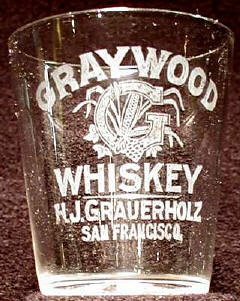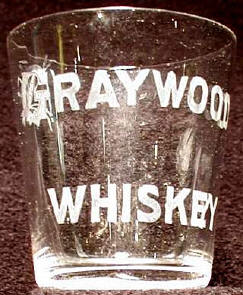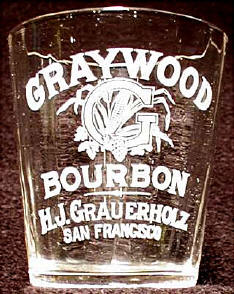|
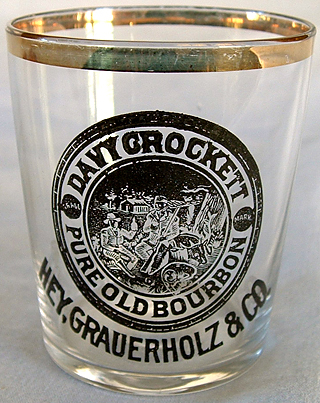
|
|
"Hey, How About
That
Shot Glass?"
|
|
|
In Robin’s
recent report of the Federation of Historical Bottle
Collectors’ Reno, Nevada, show, he drooled over a “one-of-a-kind
black etched Davy Crockett” shot glass. This glass, shown at left,
hails from the creative minds of Hey, Grauerholz & Co. |
We don’t have a lot of information about this company. The
pre-pro
database reports that in his early years, John Hey worked as a
porter for the wholesale wine and liquor company, Kelly, Henderson &
Gilchrist. In 1883 Hey broke away from this company and started his
own business, working in partnership with Henry J. Grauerholz and
Henry Fautz. The name, “Hey, Grauerholz & Fautz” was used from 1884
to 1887. Later, the name became the more familiar “Hey, Grauerholz &
Co.”
In 1906 this company was hit by the San Francisco earthquake. At
that time it appears that the business was located at 224 Front
Street. Shown here are two pictures of Front Street that were taken
after the earthquake:
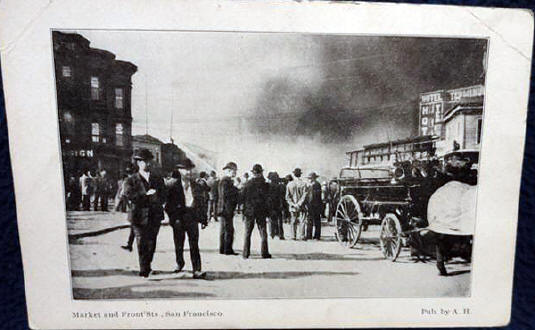
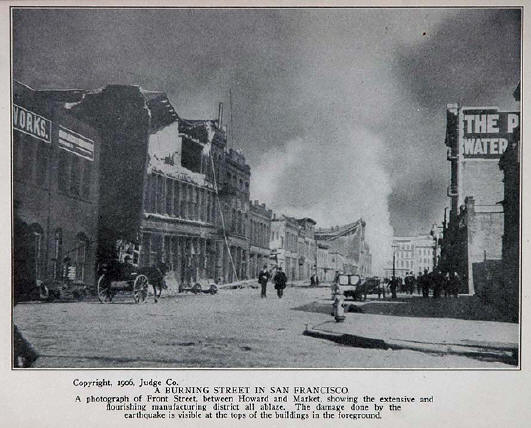
Both pictures show evidence of burning buildings. Historians have
estimated that up to 90% of the earthquake’s total destruction was
the result of post-quake fires. More than thirty fires, caused by
ruptured gas mains, destroyed approximately 25,000 buildings on 490
city blocks.
Contemporary stories add a horrific tenor to the effect of these
fires. Consider the two following accounts.
“When the fire caught the Windsor Hotel at Fifth and Market streets,
there were three men on the roof, and it was impossible to get them
down. Rather than see the crazed men fall in with the roof and be
roasted alive, the military officer directed his men to shoot them,
which they did in the presence of 5,000 people.”
“The most terrible thing I saw was the futile struggle of a
policeman and others to rescue a man who was pinned down in burning
wreckage. The helpless man watched it in silence till the fire began
burning his feet. Then he screamed and begged to be killed. The
policeman took his name and address and shot him through the head.”
Note, though, that these two incidents may be apocryphal. In my
study of the Great Chicago Fire of 1871, I discovered that the many
stories of murder and mayhem on the streets of the Windy City were
largely fictional.
|
The pristine black-etched glass pictured above indicates that one of
the brands of whiskey that Hey, Grauerholz & Co. sold was Davy
Crockett Pure Old Bourbon. Shown here is both another version of
this glass and also a whiskey bottle.
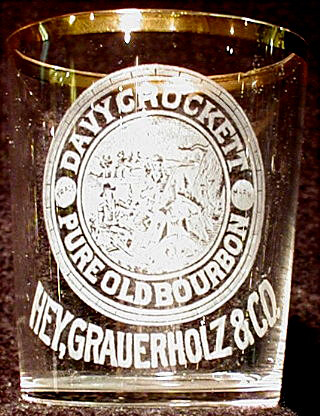 |
 |
Hey, Grauerholz & Co. also sold “New Century Bourbon.”
After the earthquake, Henry Grauerholz rebuilt a wholesale trade
business, and this company, “H.J. Grauerholz,” continued until 1913,
selling “Graywood” whiskey and bourbon.
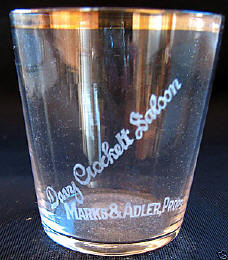 |
But the brand name “Graywood” seems so mundane when compared to the
“Davy Crockett” brand. And little wonder. David “Davy” Crockett was
a real-life 19th century folk hero who fought and died in 1836 at
the Battle of the Alamo.
It comes as little surprise that Hey, Grauerholz & Co. was not the only company to place the Davy Crockett
name on a shot glass. Note two other examples, shown at left.
Alas, it appears that during the years after the repeal of
Prohibition, the story of Davy Crockett faded into obscurity. But
not completely--his legend exploded back into the mainstream of the
national consciousness in the 1950s. Across the country post-World
War II families were putting television sets in their living rooms,
and with his TV show starring Fess Parker, Walt Disney was able to
introduce a whole new generation of Americans to this “King of the
Wild Frontier.” |
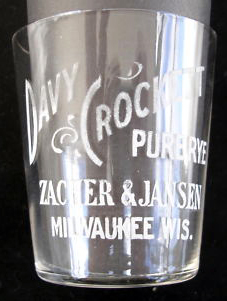 |
|
But what inspired Disney to bring back this forgotten icon of the
American West? Perhaps Disney was sitting in his study one evening,
drinking whiskey out of a shot glass that a grateful parent of one
of his mouseketeers had given him. As he held the glass in his hand,
he looked down at its etched image, and he started thinking, “I
wonder if. . . .” |
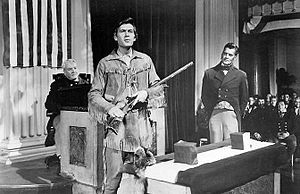 |
|





